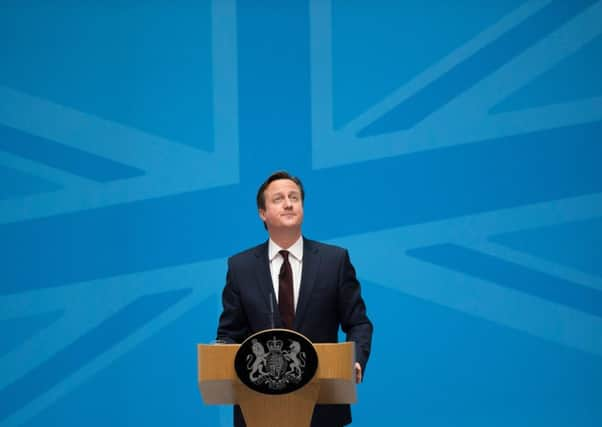Leaders: EU referendum | Edinburgh’s Festivals


IN or out? It’s a straight choice. Britain either wants to be in the EU, or out. We will find out in the course of this parliament, when a UK-wide referendum is held. Simple, is it not?
Far from it. As we found out during the independence referendum, the difference between Yes and No was a hugely complicated matter. In or Out is unlikely to be a black or white matter either. Clear as mud, in all probability.
Advertisement
Hide AdAdvertisement
Hide AdFor some, there is no debate required. Mindsets are fixed, and opinions have been formed. If the referendum was tomorrow, the smart money would be on an In vote.
But with Ukip attracting almost four million votes at the election, the demand for action on Europe is clear for Prime Minister David Cameron, even if that voice does not yet represent a body of opinion large enough to carry an Out vote.
Mr Cameron’s intention to see off the anti-EU brigade by renegotiating what he believes would be a better deal for the UK was given a boost yesterday when Germany’s finance minister, Wolfgang Schauble, indicated that he considers Britain’s possible exit as undesirable enough for Germany to look at co-operating with Britain on reforming the EU from within. “We have a huge interest in the UK remaining a strong and engaged member of the European Union,” said Mr Schauble.
That huge interest can be defined as economic power, and prestige. Without the UK, the EU is diminished and stands less chance of success. The loss of a key player at this stage would be a major setback for the Union.
But Mr Cameron’s strategy remains a risky one, which could backfire. He did not want to be the Prime Minister who presided over the break-up of Britain, and nor does he relish having an EU exit as his legacy.
To be successful, Mr Cameron has to renegotiate the UK’s relationship with the EU – or show evidence of leverage – ahead of a referendum. If the outcome of his talks feels unconvincing, he will find himself with a struggle on his hands. To win over the doubters, he has to provide evidence to back up his belief that he can make the required change from within.
Mr Cameron’s biggest difficulty is that the change he seeks is not in his gift. With smaller EU members resistant to concessions being granted, Mr Cameron will have to persuade strong powers such as France and Germany to back him. They will control his fate.
The Prime Minister has not made a terrific start in his bid to win friends and influence people by announcing his intention to scrap the Human Rights Act and exempt the UK from implementing unfavourable European Court of Human Rights rulings. To achieve the kind of relationships he needs if he is to bargain successfully with member states, he would do well to heal divisions first.
No need to fear for future of festivals
Advertisement
Hide AdAdvertisement
Hide AdTHE guardians of Edinburgh’s festivals could never be accused of complacency. Warnings are issued annually that the city has to work harder to maintain its global status as a festival capital.
Yesterday, a ten-year plan to protect the status of events such as the Edinburgh International Festival, the Fringe, the Tattoo and the city’s Hogmanay celebrations warned of the loss of “premier division” status if current levels of financial backing are not maintained.
In truth, while we like to think that New Year celebrations in Scotland’s capital city are the best in the world, there are many who could make the same claim. But when August comes around, the Festival, Fringe and Tattoo create an atmosphere which is unique. Is there anywhere else quite like Edinburgh when the festivals come to town?
The threat of complacency is not the only annual refrain with which we have become familiar. Every summer, we hear how the festivals are bigger this year than ever before – with yet more shows, box office records broken once again, and the city enjoying an economic boom from the influx of tourists. No wonder yesterday’s report highlights accommodation shortages as a concern. Are the festivals in fact now too big?
Of course, quality is just as important as quantity, and there are standards to maintain at the top end, which is an expensive business. However, the festivals have grown to their current size over several decades, and should look forward with confidence rather than trepidation. It is as appropriate now to secure future funding as it has always been, but perspective would suggest the festivals’ reputation for excellence is not as fragile as might be feared.